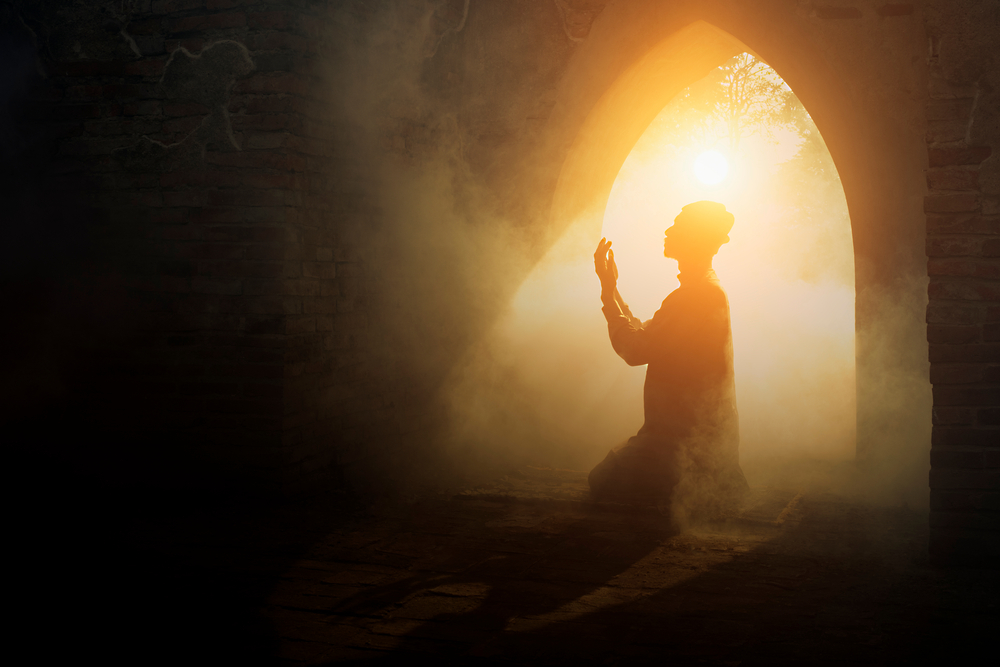What is Buddhist Practice?
Forthcoming events for w/c 20th June 2022
There is a marked difference in how Buddhism is practiced in non-native Buddhist countries.

Muslim in prayer during Eid
Shutterstock
A good few years ago when I was still teacher-in-residence at Shobo-an Zen Buddhist Training Temple, we had a visit from a Sri Lankan Bhikkhu. He had a question for me: "How do your group members practice Buddhism?"
He was on a fact-finding mission asking this question to groups around the world in different countries. He had perceived a problem with how Buddhism was practiced in his own country. He was particularly interested in the mission of Mahayana groups to teach the same to lay people and monastics. Buddhism in Sri Lanka has been almost exclusively Theravadin for centuries but of late some Mahayana groups have also made an appearance and have been quite successful there.
Sri Lanka is the oldest continually practicing Buddhist country in the world. Buddhism was first introduced in the 2nd century B.C.E. and has been a major presence ever since.
The bhikkhu was particularly interested in how much interest there was in meditation in our group. He told me that if he put on a talk about the lay precepts he would get a full house, but a meditation class might attracts only a handful of people. When he told me this, I smiled and said that in the U.K. the reverse would probably be true!
This week I've been working with Jamie Shavdia with whom I made a series of podcasts called Zen Bites which we published in The Zen Gateway magazine originally in 2017. We are in the process of compiling the talks into a book and so I've been looking again at some of the material we spoke about. The idea for the series was to discuss topics around the interface of Buddhism and psychotherapy. Jamie is a qualified working psychotherapist who is trained in the use of mindfulness and cognitive behavioural therapies and he had some interesting critiques about how the whole secular mindfulness movement was unfolding. We both agree that the use of mindfulness and meditation in the treatment of people in psychotherapy is a good thing, we both have reservations about some of the limitations imposed by the movement around the more 'spiritual or 'religious' aspects of Buddhism. Personally, I think there is a lot of benefit to devotional practices, including making offerings to the Buddhas and Bodhisattvas, prayer, chanting, pilgrimages and so on (those of you who have followed the Living with Uncertainty course may have realised this this!).
Anyone who has been to a native Buddhist country and been to a few temples will know that the laity take a strongly devotional approach to their daily practice. Most will never meditate. I recall a Japanese Zen priest coming to the Buddhist Society Summer School, where lay people enjoyed learning about all aspects of Buddhist doctrine and teachings, and saying to me that there was nothing like this for people in Japan. Although most lay-people in his temple will have a basic understanding about what the Buddha taught, this is likely to be quite rudimentary, unless they had been to study subjects at one of the Buddhist universities (usually this will be only monks or priests).
The chance of your average lay-Buddhist being able to recite the links of the 12 Linked Chain of Arising due to Conditions, is about as likely as your average Christian being able to discourse on the doctrine of the hypostatic union.
However, what is evident in native Buddhist countries is this strong devotional streak. Whilst we focus on meditation and its fruits there is good medicine in 'simple piety' that is often overlooked probably due to a certain prejudice against overt religiosity that we have developed over time. It reminds me of something Agatha Christie put in the mouth of her spinster sleuth Miss Marple: "The English do not like their religion too spiritual."
...
This week we have the last of the tutorials on the Living with Uncertainty course, module 6 on meditation. Join us on Tuesday 21st June at 1900hrs BST. The Zoom link is below.
This Thursday 23rd June is our usual live-streamed Zazen meditation, also at 1900hrs BST. The link is to be found in the meditation room use the tab at the top to navigate there.
..............
Martin Goodson is inviting you to a scheduled Zoom meeting.
Topic: Module 6 Tutorial Living with Uncertainty
Time: Jun 21, 2022 07:00 PM London
Join Zoom Meeting
https://us02web.zoom.us/j/82367368272?pwd=emZYL1RTZk4xOU1NdVVJTlZ2Rlp4QT09
Meeting ID: 823 6736 8272
Passcode: Meditation
One tap mobile
+12532158782,,82367368272#,,,,*4064419960# US (Tacoma)
+13017158592,,82367368272#,,,,*4064419960# US (Washington DC)
Dial by your location
+1 253 215 8782 US (Tacoma)
+1 301 715 8592 US (Washington DC)
+1 312 626 6799 US (Chicago)
+1 346 248 7799 US (Houston)
+1 669 900 6833 US (San Jose)
+1 929 205 6099 US (New York)
Meeting ID: 823 6736 8272
Passcode: 4064419960
Find your local number: https://us02web.zoom.us/u/kb9xcSLcNW
